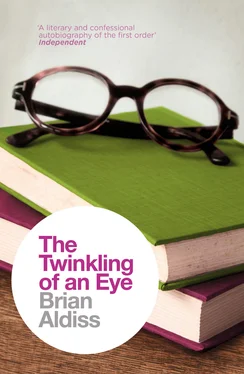Permitted to run out into the garden, I saw among a clump of irises the perfect webs of the chubby-backed garden spider ( araneus diadematus ). I had admired this pretty spider, and its industry, in my grandmother’s garden in Peterborough. The intricate construction of the web was a task I had watched with respectful attention.
A passing butterfly, a cabbage white, flew into one of the webs. As its struggles began, a small girl in a white frock rushed from the house. Seeing the plight of the butterfly, she screamed at me to save it from the nasty spider.
Although I was keen to please the girl, I could not but see the matter from the spider’s point of view; in hesitating, I allowed her to rush out from her corner and seize upon the butterfly. The girl was distressed, and ran back into the house in tears, saying how horrid I was. Well, I too felt it was gruesome; but the butterfly’s agonies were brief and the spider had as much right to live as anyone.
Heaving themselves up from their armchairs, emerging from the house, angry distant cousins gained proximity. I was seriously scolded and ushered indoors – unfit to stay in their nice garden.
Upset though I was – and feeling a degree of guilt – I knew the grown-ups were wrong. The sundry shortcomings of nature, like the way in which we all ate each other or perished, were givens with which one had to live. In the circumstances, observation made more sense than interference. Unfortunately, this has become rather a lifetime principle.
Dot and I watched Bill as he rubbed black Cherry Blossom boot polish into his sideburns, which grey had already invaded. Preparing a lie about his age, he walked down to the recruiting office in Gorleston and volunteered for the RAF. He could still fly. He was lean and fit, forty-eight pretending to be forty-two. The recruiting officer turned him down. Bill was a brave man, and was shaken by this rejection.
His thoughts then turned to our safety. We could see the North Sea from our attic window. When war came, we would be shelled or bombed – or, of course, invaded. Bill decided therefore that we should move to the other end of the country.
In the school holidays of summer 1939, Betty and I walked barefoot from the house down to the beaches and promenades, to spend our whole sunny day there as usual, on the sand, in the sea, chatting to shopkeepers, sailing a clockwork speedboat in the yacht pool, or watching the Punch and Judy show (every scene of which we had by heart).
The front at Gorleston provided a spectacle of which we never tired. It was safe and peaceful. Somewhere across the sea, the tyrannies of Nazi Germany and the more firmly entrenched regime of Stalin’s Soviet Union were busy at their gruesome tasks of enslaving and killing whole populations.
But the British Empire was safe, the colour bar securely in place in its colonies. Tea was still served at four, while the Yankee dollar was worth only two half-crowns.
Betty and I were happy in Gorleston. When I fell ill and was confined to bed, I wrote and illustrated a long verse drama set in Victorian times. The story moved freely from a stage play into real life and back. Where I got the idea from I do not know; now it is a commonplace of deconstructionists – a word unknown in the thirties. It was my first sustained piece of writing. Its subject was the question of appearances: something was happening but – wait! – it was merely being acted!
From the local Woolworth – then still ‘The 3d and 6d Stores’ – Betty and I bought issues of McGlennan’s Song Book . In triple columns, it published the words of the latest popular songs. Betty and I sat in bed together, singing songs made famous by Hutch, Dorothy Carless, Gracie Fields and others: if not melodiously, enthusiastically.
Being mere children, Betty and I were not privy to Bill’s plans. One day, we were hauled in from the beach and told we were going on holiday to the West Country, to Devon.
The Bernard Road house was closed up, our beloved cat Tiny was left in a neighbour’s care. We then undertook a trek across the south of England, arriving eventually at Witheridge, in the middle of Devon. Norfolk born and bred, we were impressed by, or perhaps a little contemptuous of, the hills and valleys; we had grown to prefer a flat world. In Witheridge we stayed on Thorn’s farm, where the young farmer’s wife fed us enormous breakfasts and evening meals. My fourteenth birthday occurred on the farm; my parents gave me a watch.
The sights, sounds and smells of the farm absorbed all our attention. In Witheridge, they had never heard of Hitler. Bill had his gun, went out shooting rabbits, was a countryman again, trying to forget his recent disasters in East Dereham.
The time of childhood was not entirely over. Whatever my new watch said, hours and days were still dawdling by. On the farm we had for company other creatures who did not live in the brisk adult time flow: the calves, young sheep, kittens and the Thorns’ two dogs. We measured out our days in Wellington boots. It was a timeless time – less than a month away from the declaration of war.
We left the farm and drove to a place called Pinhoe, on the outskirts of Exeter, where Father bought a caravan. We had to live in it for two days on the sales area by a busy road until Bill’s cheque was cleared by the local bank.
Towing the caravan, we drove to Cornwall, sleeping overnight – sensation – in a farmer’s field. Next day, we arrived at Widemouth Bay, to the west of Bude. Betty and I had yet to realise that that caravan was actually our home.
Widemouth was a beautiful wild place, not far from Tintagel, legendary home of King Arthur. Sheep had grazed the grass short to the very edge of the cliffs. Contained in the bowl of pasture was a small whitewashed cottage which served as the only shop for miles; it sold milk, bread, and – more importantly as far as Betty and I were concerned – Lyons’ fruit pies, 4d. Just beyond the shop was a sheer drop of cliff to the rocks below, all vastly different from the tame seasides of the Norfolk coast. We climbed the rocks, ventured into deep pools, caught small fish, watched the waters of the Atlantic wallop into barnacled fissures in the cliff face. Whatever I did, my small sister followed faithfully.
Close by the whitewashed cottage, one other caravan stood. From our caravan window we enjoyed a panorama of the Atlantic. How quiet was the Atlantic in those brassy August days! And I ventured at last to pluck up courage and ask Bill, ‘Will I go back to Framlingham?’
He answered casually, as if everything had long been settled in his mind. ‘We’ll find you a school near here.’
Oh, the joy of it! The relief!
War had presented me with an escape from a fate I feared more than anything else. I firmly believed that Framlingham College spelt spiritual death for me. Every day of my three years there was spent in dread.
To give an instance of the teaching, which was Gradgrindian in temperament: our French lessons were devoted to learning irregular verbs, we were not taught to speak French, or to enjoy the beauties of French literature; long lists of irregular verbs offered better opportunity for chastisement. Days were spent moving from classroom to classroom, carting books about, learning how to escape punishment.
Hardly surprisingly, by reflex we punished each other. Carrying those books about, we always put our Bibles on top of the pile. One boy allowed a Latin textbook to lie on top of his Bible. We beat him up.
And the foul hours of night. Arriving within those walls at the age of eleven, I was unaware of sex, except as a sort of game we had innocently played. Sex had been unknown at St Peter’s Court, my preparatory school. That first week in the junior dormitory at Framlingham, the head boy of the dormitory crept into my bed. I was overwhelmed with disgust and shame at his advances, and I feebly pushed him away.
Читать дальше












